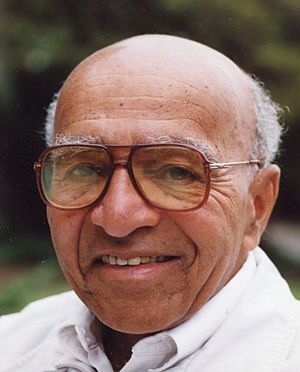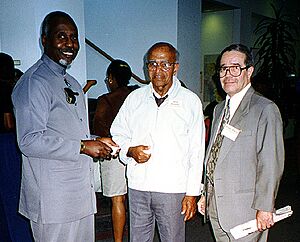David Blackwell facts for kids
Quick facts for kids
David Blackwell
|
|
|---|---|

Blackwell in 1999
|
|
| Born |
David Harold Blackwell
April 24, 1919 Centralia, Illinois, U.S.
|
| Died | July 8, 2010 (aged 91) Berkeley, California, U.S.
|
| Nationality | American |
| Education | University of Illinois at Urbana-Champaign (BA, PhD) |
| Known for | Rao–Blackwell theorem Blackwell channel Arbitrarily varying channel Games of imperfect information Dirichlet distribution Bayesian statistics Mathematical economics Recursive economics Sequential analysis |
| Awards | Member of the National Academy of Sciences (1965) John von Neumann Theory Prize (1979) R. A. Fisher Lectureship (1986) |
| Scientific career | |
| Fields | Probability Statistics Logic Game theory Dynamic programming |
| Institutions | University of California, Berkeley |
| Thesis | Some properties of Markoff chains (1941) |
| Doctoral advisor | Joseph Leo Doob |
| Notable students | Roger J-B Wets |
David Harold Blackwell (born April 24, 1919 – died July 8, 2010) was an amazing American statistician and mathematician. He made huge contributions to many areas of math. These included game theory (which studies how people make decisions), probability (the chance of something happening), and information theory (how information is measured and sent).
He was the first African American person to join the National Academy of Sciences. This is a very important group of top scientists in the United States. He was also the first black professor to get a permanent job at the University of California, Berkeley. David Blackwell was a true pioneer in his field!
He also helped write one of the first textbooks on Bayesian statistics. This is a way of using math to update your beliefs as you get new information. By the time he retired, he had written over 90 books and papers.
Contents
Early Life and Education
David Harold Blackwell was born on April 24, 1919. His hometown was Centralia, Illinois. His mom, Mabel, stayed home to care for the family. His dad, Grover, worked for the Illinois Central Railroad. David was the oldest of four children.
He grew up in a community where different races lived and went to school together. David was always great at math. His teachers even moved him ahead a few grades in elementary school. But it was in high school, during a geometry class, that he truly fell in love with math. He was such a smart student that he finished high school in 1935 when he was just 16 years old.
Blackwell then went to the University of Illinois at Urbana-Champaign. He first planned to become an elementary school math teacher. But he kept studying and earned his bachelor's degree in math in 1938. He got his master's degree in 1939. By 1941, at only 22 years old, he had earned his Doctor of Philosophy (Ph.D.) in mathematics. All his degrees were from the University of Illinois.
Career and Research
After getting his Ph.D., Blackwell spent a year doing advanced research. This was at the Institute for Advanced Study (IAS) in 1941. He had a special scholarship called a Rosenwald Fellowship. While there, he met a famous mathematician named John von Neumann. Von Neumann asked Blackwell to talk about his Ph.D. work. Blackwell thought von Neumann was just being polite. But von Neumann asked again a few months later. Blackwell said that von Neumann listened to him talk about his math. In just ten minutes, von Neumann understood it better than Blackwell did!
However, Blackwell faced challenges because of his race. He was not allowed to attend classes or do research at nearby Princeton University. This university often worked with the IAS. Because of this unfair rule, he left the IAS.

Blackwell wanted a permanent job. He sent job applications to 105 different colleges. At that time, he believed that a black professor could only teach at colleges for black students. He also applied to the University of California, Berkeley. A statistician named Jerzy Neyman interviewed him and wanted to hire him. But the head of the math department, Griffith C. Evans, said no. He worried about his wife's feelings. It was common for them to invite all department members to dinner. She did not want a black person in her home. This shows the unfairness Blackwell faced.
Howard University
Blackwell took a job at Southern University in 1942. Then he taught at Clark College for a year. In 1944, he moved to Howard University. Within three years, he became a full professor and the head of the Mathematics Department. He stayed at Howard until 1954.
During the summers from 1948 to 1950, Blackwell worked at RAND Corporation. He worked with other mathematicians there. They studied the theory of "duels," which is part of game theory. In 1954, Blackwell and Meyer A. Girshick published a book together. It was called Theory of Games and Statistical Decisions.
Blackwell wrote one of the first textbooks on Bayesian statistics. It was called Basic Statistics and came out in 1969. This book later inspired another important statistics textbook.
University of California, Berkeley
In 1954, Blackwell became a visiting professor at the University of California, Berkeley. He was hired as a full professor in the new Statistics Department in 1955. He even became the head of the Statistics department in 1956. He spent the rest of his career at UC Berkeley. He retired in 1988.
In 2018, UC Berkeley honored him by naming a student dorm after him. It is called David Blackwell Hall. It opened in the fall of 2018.
Honors and Awards
David Blackwell received many important honors and awards for his work:
- He was an invited speaker at the International Congress of Mathematicians in 1954.
- He was the President of the Institute of Mathematical Statistics in 1956.
- He was chosen as a member of the National Academy of Sciences (NAS) in 1965.
- He became a member of the American Academy of Arts and Sciences (AAAS) in 1968.
- He was President of the Bernoulli Society for Mathematical Statistics and Probability from 1975 to 1977.
- He was made an Honorary Fellow of the Royal Statistical Society (RSS) in 1976.
- He was Vice President of the American Statistical Association (ASA) in 1978.
- He won the John von Neumann Theory Prize in 1979.
- He received the R. A. Fisher Lectureship in 1986.
- He received the Berkeley Citation in 1988.
- He was part of the 2002 class of Fellows for the Institute for Operations Research and the Management Sciences.
- He was awarded the National Medal of Science in 2012. This was given to him after he passed away.
- The Blackwell-Tapia prize is named in honor of David Blackwell and Richard A. Tapia.
On October 3, 2014, President Obama officially gave Dr. Blackwell the National Medal of Science. Two of his children, Hugo Blackwell and Sara Blackwell Hunt, accepted the award for him.
Personal Life and Death
David Blackwell married Annlizabeth Madison on December 27, 1944. She was also a college graduate. They had eight children together.
David Blackwell passed away on July 8, 2010. He was in Berkeley, California. He died from problems caused by a stroke.
 | Toni Morrison |
 | Barack Obama |
 | Martin Luther King Jr. |
 | Ralph Bunche |

